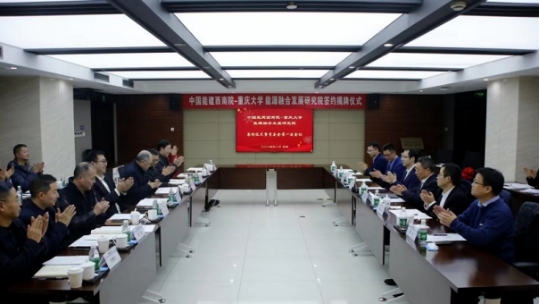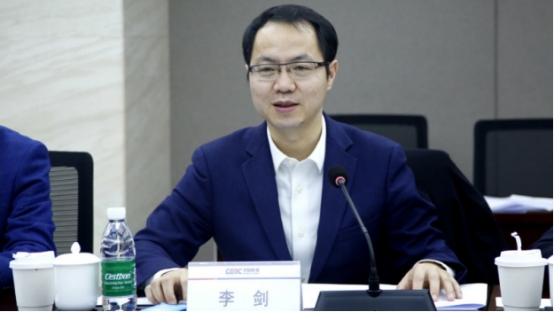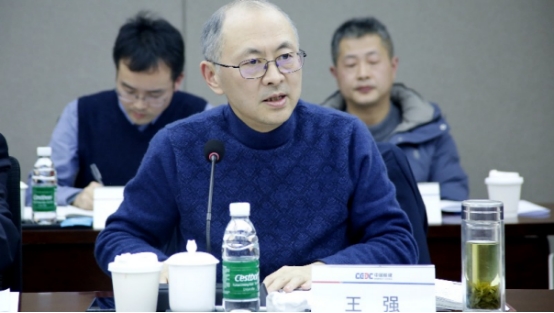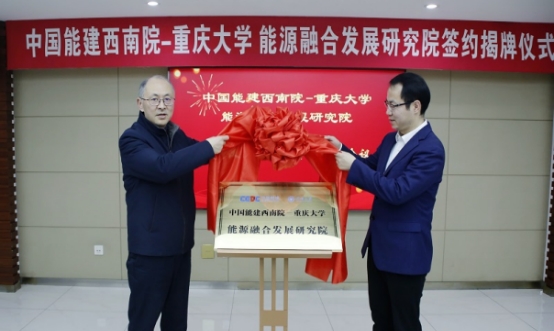On January 8, 2024, the signing ceremony of the Southwest Institute of China Energy Construction Group and Chongqing University Institute for Energy Integration and Development was held in Chengdu, along with the inaugural meeting of the Management Committee. Wang Qiang, Party Secretary and Chairman of the Southwest Institute, and Li Jian, Deputy Party Secretary and Vice President of Chongqing University, attended the meeting. They jointly witnessed the signing of the agreement and the unveiling of the Institute's plaque. The meeting was presided over by Li Liang, Party Committee Member and Vice General Manager of the Southwest Institute.

Li Jian expressed heartfelt gratitude to the China Energy Construction Southwest Institute for its long-standing care and support for the school. He pointed out that building a new energy system and promoting the integrated development of energy are key technologies in achieving the strategic goal of carbon peaking and carbon neutrality by 2030 and 2060, respectively. Chongqing University will fully leverage its advantages in scientific research, discipline construction, innovation platforms, and top talents to innovate in scientific research cooperation and industry-education integration models. The university will delve into frontier basic research, applied technology research, technology transfer, innovation platform construction, and talent cultivation in the field of energy integration. This effort aims to strengthen and optimize the Institute, serving the national strategy of achieving high-level scientific self-reliance and promoting the construction of the Chengdu-Chongqing economic circle.

Wang Qiang stated that as a "demonstration enterprise for science and technology innovation," the Southwest Institute is deeply engaged in the "Three-Year Action Plan for Strengthening Enterprises with Science and Technology." It focuses on the "one center" of systematic solutions and the "two support points," vigorously advancing key core technology research and development and the construction of science and technology innovation platforms. He expressed hope for innovative cooperation methods and paths between the two parties, aiming to better leverage the "market-enterprise-university" collaborative mechanism. Wang Qiang emphasized the need to focus on enterprise demands and societal needs, increase efforts in talent exploration, cultivation, and attraction, and adopt flexible approaches to talent recruitment and utilization. This would enhance innovation capabilities and research skills in practice, thus creating high-quality resources for the high-quality development of both sides. Furthermore, he stressed the importance of integrating core technology research and development with market demand, focusing on long-term development and selecting key topics to advance energy science and technology research. Accelerating the industrialization of scientific and technological achievements would help drive the transformation and upgrading of the energy industry.

The establishment of the Institute is one of Chongqing University's significant measures in focusing on national strategic needs and promoting the integration of industry, academia, and research to drive innovation. The Institute will deeply focus on the construction of the national new energy system and the trends in energy integration development. It will prioritize collaborative research and development in new energy technologies, particularly in energy and power, to promote industrial development and transformation. The ultimate goal is to gradually establish an innovation hub in the western region for energy integration, contributing to regional development and advancement in this field.

The meeting was attended by Hu Jianlin, Party Secretary of the School of Electrical Engineering at Chongqing University; Yu Nian, Vice Dean of the Institute of Scientific and Technological Development; relevant leaders from the School of Electrical Engineering, the State Key Laboratory of Power Transmission Equipment Technology, and other related departments; Yu Bo, Deputy Chief Engineer of the Southwest Institute and Director of the Dual Carbon Research Center; Xiong Tao, Deputy Chief Engineer of the Southwest Institute and Director of the Construction and Energy Integration Research Center; as well as other department heads.